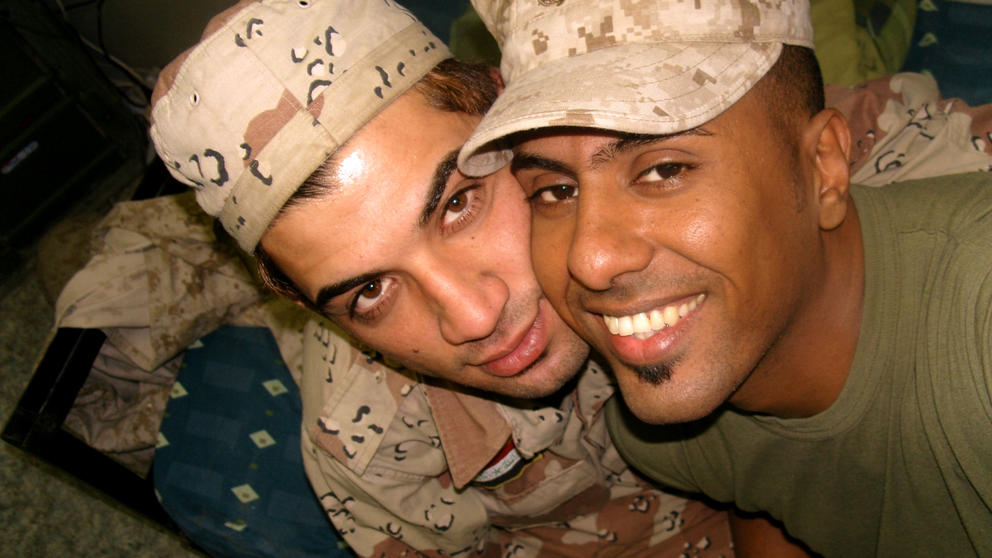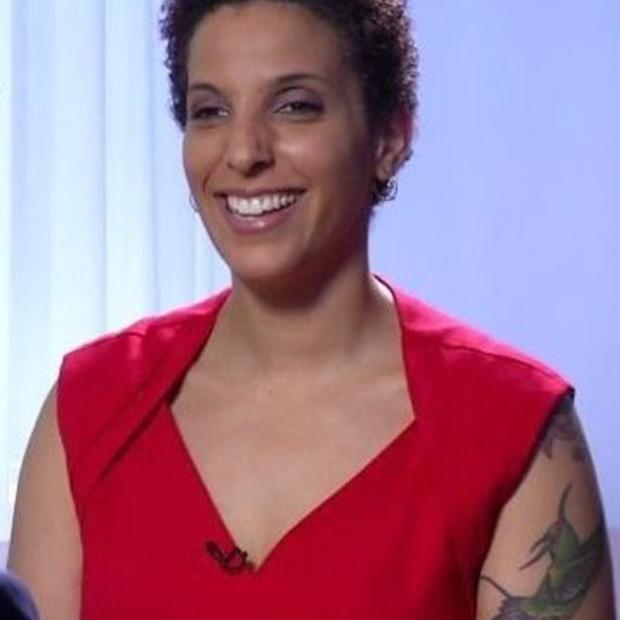Subtitles on a screen read like a love poem. “I love you to death. I love you to death. I love you to death. I would die for you.
“This message is coming from the middle of the road to you…There are many terrorists around.”
Translated from Arabic, these are the words of Btoo Allami, one of the men featured in the documentary “Out of Iraq,” debuting on cable’s Logo at 9 p.m. on Monday (June 13). Recording his fears on his mobile phone’s camera, Allami mutters them like a protective mantra while walking away from life as he knows it in a desperate attempt to reunite with his partner, Nayyef Hrebid.
It is November 2010 and Allami, a gay man, has no choice but to flee Baghdad, on a journey that will eventually take him to Seattle. If his community becomes aware of his sexual orientation, he could be murdered in an “honor killing” committed by members of his own family. So this is a journey that may take him away from immediate danger but, as the film shows, not necessarily out of peril.
Work on what became the documentary had already started. “It was not easy for me, because [I] was still there in the Middle East when they were filming me and if [people there] were to find out about it, it was also going to be bad and difficult for him,” Allami explains during a recent phone interview, with Hrebid acting as his translator. “At the same time, I think, ‘We need to get our voice out.’“
Hrebid adds, “They know about you, even if you’re here in the United States. But we decided [to do] this because we were thinking this is going to be a message from us to the others, to help the others who are still back there and helping people to understand what we go through back in Iraq.”
Produced and co-directed by Chris McKim and Eva Orner, winner of the 2008 Academy Award for Best Documentary for “Taxi to the Dark Side,” “Out of Iraq” depicts Hrebid and Allami’s more than five-year journey to get Allami to safety. But the documentary’s intended purpose is much larger than merely to tell a tale of love conquering all obstacles.
“Out of Iraq” is a timely addition to our national conversation about our role in the growing international refugee crisis. And, in the wake of the horror in Orlando, it can also provide a deeper understanding of the terror that drives people to embark on a dangerous trip to begin a new life. It may be simple for the average TV viewer to form an opinion based on cable news segments or pundit analysis, but it’s an altogether more visceral experience to watch footage that the documentary includes of people being thrown from the tops of buildings, or executed in the streets, because they were unable to escape the horror that has arrived on their doorstep.
Ordinary citizens pass down death sentences on their own neighbors and, sometimes, family members. The incursion of ISIS throughout the Middle East has only made this practice more rampant.
“It’s not a good feeling for someone to leave his own home,” Allami says, “but at the same time it is good because they survive, because it’s really bad to stay there or they get killed. No one leaves home without a really big reason and risks his life.”
“Out of Iraq’s” love story begins with Hrebid recalling his childhood in Iraq, demonstrating how he came to embrace his identity as a gay man living in a fundamentalist culture. An art student who became a translator for the American armed forces in Iraq, Hrebid met Allami while he was stationed in Ramadi.
Eventually, Hrebid was able to secure a Special Immigrant Visa in exchange for his service as an interpreter, and left Iraq in 2009. Allami, a soldier in the Iraqi army, had no such option and remained behind.
All of Hrebid’s efforts to help Allami leave Iraq were fruitless before he met Dr. Michael Failla, a Seattle-based chiropractor, philanthropist and activist who has helped refugees from Cambodia, Ethiopia, Somalia and Saudi Arabia, escape persecution. Hrebid and Allami’s story eventually attracted the attention of the documentary’s producers as well.
Hrebid and Allami’s story has been told in various news outlets, so it’s not a spoiler to report that are married and living their version of happily ever after in Seattle. The couple also recognizes their good fortune: As “Out of Iraq” makes clear, without Failla’s assistance, it’s likely that Allami could have suffered a difficult fate, similar to many refugees who face everything from protracted limbo in a camp to return to dangerous conditions at home.
In order to be considered for refugee status, Allami had to undergo numerous interviews with the United Nations High Commissioner for Refugees, an entity already thin on resources and further taxed by the waves of people fleeing unstable and war-torn regions such as Syria. His application was left in abeyance a number of times during this process, in part because identifying as a homosexual in a hostile culture was not considered by the UNHCR to be an existential threat, or a compelling reason for refugee status.
At one very tense point in “Out of Iraq,” an incorrect interpretation of Allami’s answer to an interview question nearly landed him on an exclusion list. That would have sent him back to Iraq and, likely, his death. But while awaiting a decision from the UNHCR, Allami secured an interview with the Canadian Embassy in Lebanon and, with the help of Failla’s private advocacy group, New Life, was able to relocate to Vancouver, B.C.
Today, in addition to recently promoting the film at the Los Angeles Film Festival and attending a screening at the United Nations Economic and Social Council Chamber in New York, Hrebid and Allami have helped sponsor eight fellow LGBTQ Iraqi refugees and are working to assist more.
“Seattle is my home now,” Hrebid declares. “I’m still missing being back in Iraq, but Seattle is where I feel I belong because of the people here -- I can be with them who I am. It’s my new home, it’s Btoo’s home, and we could not have a better life.”
At the same time, he adds, “There’s still a lot of people…living this bad situation every single day. We just bring our story as a small example of a lot of things going on with the LGBT community there. We’re hoping that the new generation will be accepting of the LGBT community there in the Middle East.”


